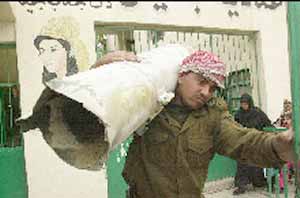Iraq often sees sandstorms in the spring, but Tuesday's storm was exceptional, bringing dust and sand from as far away as Egypt and Libya, AccuWeather meteorologst John Gresiak said. He said lighter winds were forecast Wednesday and then no major sandstorms for at least several days. State radio and television continued to broadcast patriotic songs and archival footage of Saddam, their president of 23 years. Tuesday's edition of Babil, a daily paper owned by Saddam's son Odai, published on its back page pictures of decapitated bodies it said belonged to Iraqi civilians killed in bombing raids. All newspapers published on their front pages the text of Saddam's address to the nation on Monday, along with pictures of the Iraqi leader. Garbage seemed to be piling up in parts of the city, though public buses were running normally, many more shops than at any other time since the war began last week were open, and traffic picked up, reaching perhaps half the prewar level. Iraqi Information Minister Mohammed Saeed al-Sahhaf said Tuesday that eight coalition soldiers were killed and three armored carriers destroyed in a battle in Suq ash-Shuyukh, about 18 miles south of An Nasiriyah. British military officials at U.S. Central Command said they had no information about the report. Sahhaf also singled out an Iraqi woman named Mayssoun Hamid Abdullah as a heroine for striking an armored vehicle with a rocket-propelled grenade. He said that the Iraqis "await surprises on how the American game of shock and awe will fail." Also Tuesday, Iraqi Trade Minister Mohammed Mehdi Saleh lashed out at U.N. Secretary-General Kofi Annan, the United States and Britain, accusing them of preventing food and medicine from reaching his country via the U.N. oil-for-food program. "America and Britain should not punish this great people with it barbaric methods," he said. Nevertheless, he said the government has distributed six months' rations to its citizens, and "we assure them that we have enough food and medicine to confront the enemies." Also, Iraqi Vice President Taha Yassin Ramadan complained that other Arab countries have failed to support Iraq, and he suggested instead that they impose an oil embargo on the United States and Britain. "Don't you think that halting the flow of oil to America and Britain will break the back of the aggression?" Ramadan asked.
|
